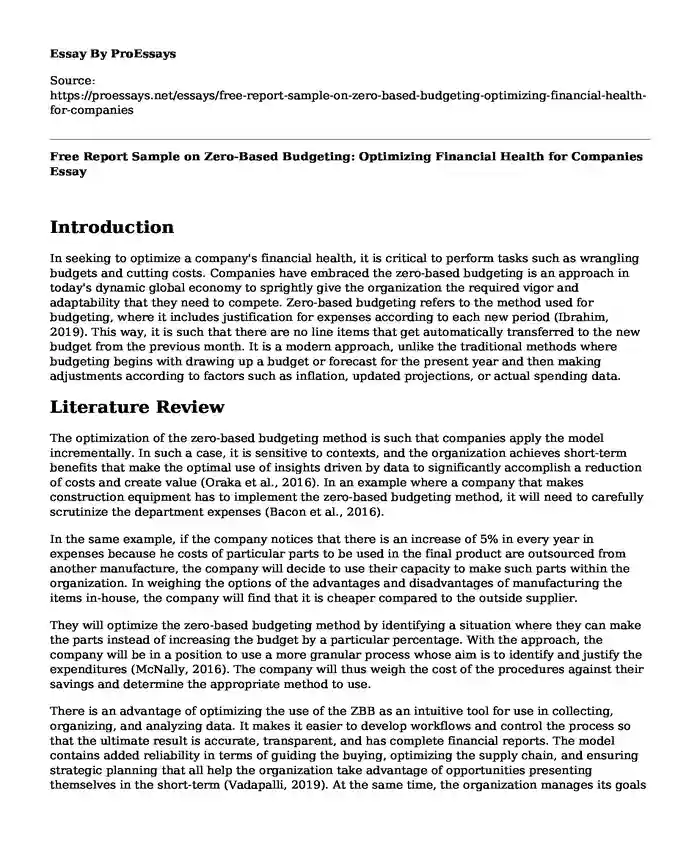Introduction
In seeking to optimize a company's financial health, it is critical to perform tasks such as wrangling budgets and cutting costs. Companies have embraced the zero-based budgeting is an approach in today's dynamic global economy to sprightly give the organization the required vigor and adaptability that they need to compete. Zero-based budgeting refers to the method used for budgeting, where it includes justification for expenses according to each new period (Ibrahim, 2019). This way, it is such that there are no line items that get automatically transferred to the new budget from the previous month. It is a modern approach, unlike the traditional methods where budgeting begins with drawing up a budget or forecast for the present year and then making adjustments according to factors such as inflation, updated projections, or actual spending data.
Literature Review
The optimization of the zero-based budgeting method is such that companies apply the model incrementally. In such a case, it is sensitive to contexts, and the organization achieves short-term benefits that make the optimal use of insights driven by data to significantly accomplish a reduction of costs and create value (Oraka et al., 2016). In an example where a company that makes construction equipment has to implement the zero-based budgeting method, it will need to carefully scrutinize the department expenses (Bacon et al., 2016).
In the same example, if the company notices that there is an increase of 5% in every year in expenses because he costs of particular parts to be used in the final product are outsourced from another manufacture, the company will decide to use their capacity to make such parts within the organization. In weighing the options of the advantages and disadvantages of manufacturing the items in-house, the company will find that it is cheaper compared to the outside supplier.
They will optimize the zero-based budgeting method by identifying a situation where they can make the parts instead of increasing the budget by a particular percentage. With the approach, the company will be in a position to use a more granular process whose aim is to identify and justify the expenditures (McNally, 2016). The company will thus weigh the cost of the procedures against their savings and determine the appropriate method to use.
There is an advantage of optimizing the use of the ZBB as an intuitive tool for use in collecting, organizing, and analyzing data. It makes it easier to develop workflows and control the process so that the ultimate result is accurate, transparent, and has complete financial reports. The model contains added reliability in terms of guiding the buying, optimizing the supply chain, and ensuring strategic planning that all help the organization take advantage of opportunities presenting themselves in the short-term (Vadapalli, 2019). At the same time, the organization manages its goals in the long-term that include growth, competitive advantage, and more innovation.
Conclusion
Zero-based budgeting is necessary for companies that prioritize building budgets that are result-oriented. The approach helps to cut waste as well as bring the team on board when it comes to making decisions that involve spending. ZBB benefits the company by improving the short-term cycle while also engaging in long-term management. Its priority is on the efficiency of resource allocation and promotes the optimization of the management of business processes.
References
Abid, H. A. (2017). A Proposed Framework for the Application of Zero-Based Budget for the Improvement of the Financial Performance (An Analytical Study of the views of some Directorates in AL-Muthanna Province). Muthanna Journal of Administrative and Economic Sciences, 7(1), 188-235.
Arica, R., Corbaci, A., & Aydin, B. (2019). An Assessment of the Marketing Budget in the Tourism Businesses. Co-Editors; 176.
Bacon, J., Rogers, C., & Chahal, M. (2016). Trends for 2017: Zero-based budgeting & influencers 2.0. Pobrano z: https://www. marketingweek. com/2016/12/08/trends-2017-zero-based-budgeting-influencers-tv (17.03. 2017).
Emerling, I., & Wojcik-Jurkiewicz, M. (2018). The risk associated with the replacement of the traditional budget with performance budgeting in the public finance sector management. Ekonomicko-manazerske Spektrum, 12(1), 55-63.
Heinrich, J., Garton, E., & Martin, B. (2016). Betting on Zero-Based Budgeting's Trifecta. Bain & Company.
Ibrahim, M. M. (2019). Designing zero-based budgeting for public organizations. Problems and Perspectives in Management, 17(2).
McNally, S. J. (2016). Zero-Based Budgeting: Building for Success Again, and Again, and Again. Pobrano z: https://www. picpa. org/articles/picpa-news/2016/11/28/zero-based-budgeting-building-for-success-again--and-again-and-again (15.03. 2017).
Miller, G. (2018). Performance-based budgeting. Routledge.
Muhammad, A. N. (2017). Budgeting in Public Libraries. Journal of Accounting and Financial Management, 3(1), 1-6.
Cite this page
Free Report Sample on Zero-Based Budgeting: Optimizing Financial Health for Companies. (2023, Nov 06). Retrieved from https://proessays.net/essays/free-report-sample-on-zero-based-budgeting-optimizing-financial-health-for-companies
If you are the original author of this essay and no longer wish to have it published on the ProEssays website, please click below to request its removal:
- Investments Essay Example: Investor Sentiment and Behavior
- Essay Sample on Role of Airline Sector in International Business
- Essay Sample on Marketing Structures and Theories
- Lapping Fraud Scheme Essay
- Essay Example on Foodservice Cost Control: Issues & Recommendations
- Adjusted Gross Income: Analysis of For and From AGI Deductions - Essay Sample
- Blockchain-Based Governance - Essay Sample







